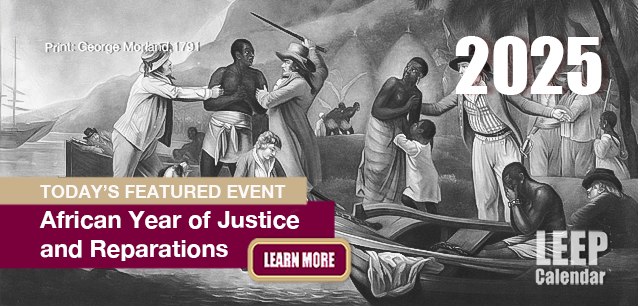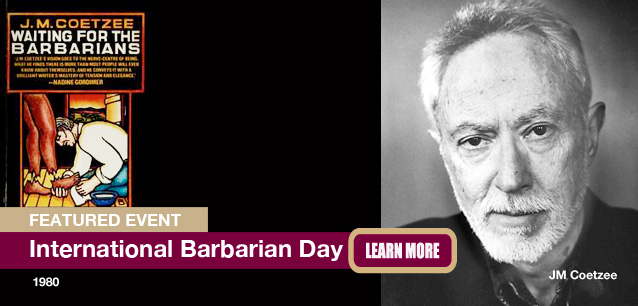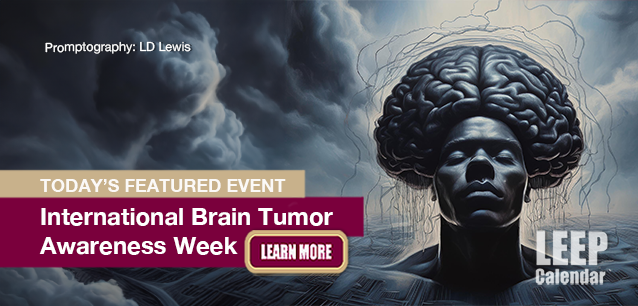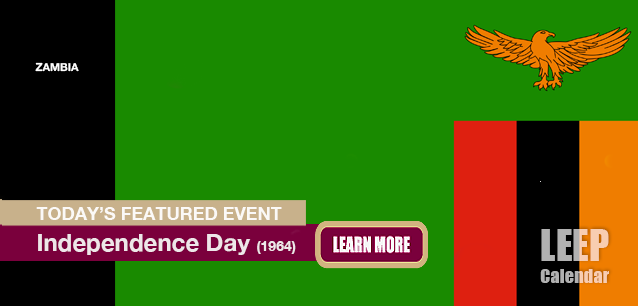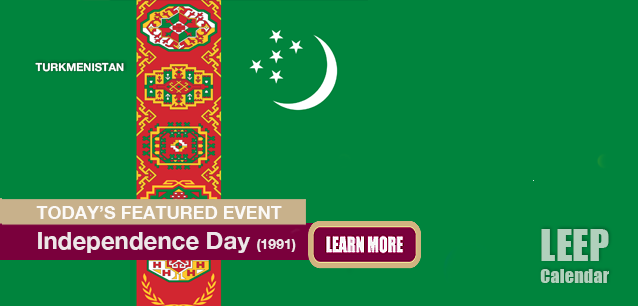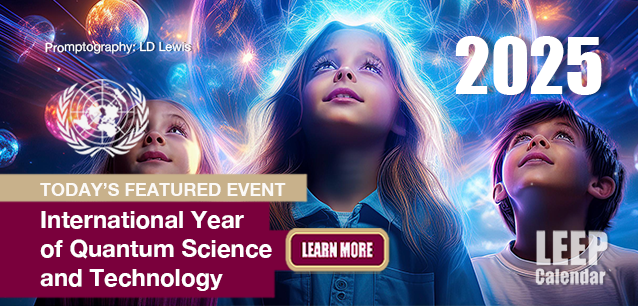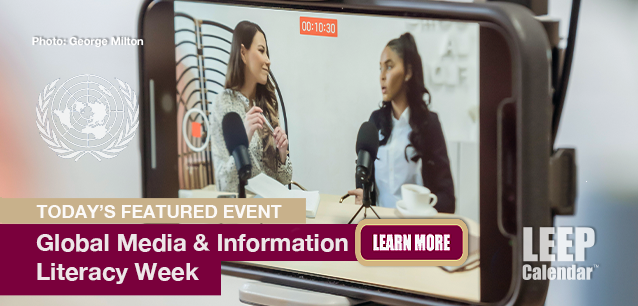 AD
AD
Country
- Africa
- Alcohol, Tobacco & Drugs
- Animals, Fish, Insects & Birds
- Anniversaries
- Australia
- Books
- Brazil & S.America
- Buddhism
Category
- Afghanistan, AF
- Aland Island, AX
- Albania, AL
- Algeria, DZ
- American, Samoa, AS
- Andarra, AD
- Angola, AO
- Anguilla, Al
Event Type
- Daily
- Weekly
- Annual
- Recurring
Duration
- All
- 1 Day
- 2 Day
- 3 Day
- 4 Day
- 5 Day
- 6 Day
Event Type
- Daily
- weekly
- Annual
- Recurring
Event Type
- Daily
- weekly
- Annual
- Recurring
Today is: October 27
Audio/Video Heritage Day, World
Bank Holiday (IE)
Barbarian Day (1980)
Cat Day, Black (UK), Ntl.
Cranky Co-workers' Day
Etiquette Day (1872)
Independence Day, (TM)(1991)
Independence Day, (VC)(1979)
Independence Day, (ZM)(1964)
Labour Day (NZ)(1862)
Mentoring Day, Intl. (UK)
Navy Day (US)(1922)
Sonographers Day, Australian (AU)
Brain Tumor Awareness Week, Intl.
Disarmament Week, World
High Point Market (US-NC)
Magic Week, Intl (1926)
Media and Information Literacy Week, Global
Origami Days, World (1898)
Prescription Errors Education Week
Red Ribbon Week (DEA)
Sausage Week, United Kingdom
ADHD Awareness Month
Adopt-a-Dog Month, (AHA)
Adopt-a-Shelter Dog Month
Alcohol Awareness Month, Collegiate Ntl.
Animal Safety and Protection Month, Ntl.
Antidepressant Death Awareness Month
Anxiety and Depression Awareness Month (AU)
Apple Month, Ntl.
Applejack Month
AquaTober
Architecture Month, Archtober
Arts and Humanities Month, Ntl.
Audiology Awareness Month, Ntl.
Autism Awareness Month (CA)
Bake and Decorate Month, Ntl.
Bat Appreciation Month
Battery Safety Month (Auto)
Bi-national Health Week (US/CA/MX-varies locally)
Big Draw, The
Bilingual Child Month, Celebrating the
Black History Month (UK)
Black Speculative Fiction Month
Bleeding Disorders Month, Ntl. (AU)
Blind Month, National Meet the
Blindness Awareness Month
Book Month, Ntl.
Breast Cancer Awareness Month, Ntl.
Bullying Month, Stop, Ntl.
Bullying Prevention Month, Ntl.
Caffeine Addiction Recovery Month
Car Care Month, Ntl. Fall
Caramel Month, Ntl.
Celiac Awareness Month (US)
Cheese Month, American
Cheshvan (J)
Chili Month, Ntl.
Chiropractic Health Month, Ntl.
Church Library Month
Church Safety and Security Month, Ntl.
Class Reunion Month
Clergy Appreciation Month
Co-op Advertising Awareness Month
Company Culture Month, Global
Company Culture Month, Global
Computer Learning Month
Contact Lens Safety Month
Cookie Month
Corn Month
Country Ham Month
Country Music Month
Crime Prevention Month, Ntl.
Critical Illness Awareness Month
Cybersecurity Month, Ntl.
Danger Run (US-KY, IN, IL)
Dental Hygiene Month, Ntl.
Depression Education and Awareness Month
Dessert Month, Ntl.
Disability Employment Awareness Month
Diversity Awareness Month, Global
Domestic Violence Awareness Month
Down Syndrome Month, Ntl.
Dyslexia Awareness Month
Eat Better—Eat Together Month
Eczema Awareness Month
Emotional Intelligence Awareness Month
Energy Action Month, Ntl.
Ergonomics Month, Ntl.
Eye Injury Prevention Month
Fair Trade Month
Family History Month
Festival of Penha (BR-RJ)
Filipino American History Month (1587)
Financial Planning Month
Freethought, Month of, Ntl.
Gain the Inside Advantage Month, Ntl.
Gay and Lesbian History Month (1979)
German-American Heritage Month (1683)
Girls Night In (AU)
Go Sober Month (UK)
Golf Month, Australia
Great Cycle Challenge (AU)
Halloween Safety Month
Head Start Awareness Month
Health Literacy Month
Healthy Lung Month
Healthy Workplace Month (CA)
Hog-out Month (US-TX)
Home Eye Safety Month
Indigenous Peoples Month, Ntl. (PH)
Indoor Air Quality (IAQ) Month, Ntl.
Islamic History Month (CA)
Italian-American Heritage Month (1492)
Jumadal-Awwal (M)
Kartika (H)
Katik (S)
Kitchen and Bath Month, Ntl.
Learning Disabilities Month, Ntl. (CA/US)
Learning and Development Month, Ntl.
Liver Awareness Month, Ntl.
Long Term Care Planning Month
Lupus Awareness Month (UK)
Medical Librarians Month, Ntl.
Medicine Abuse Awareness, Ntl.
Menopause Month, World
Museums and Galleries Month (PH)
Muslim American Heritage Month (US)
Non-GMO Month, Ntl.
Organize Your Medical Information Month
Orthodontic Health Month, Ntl.
Pasta Month, Ntl.
Pedestrian Safety Month
Pescatarian Month, Ntl.
Pet Wellness Awareness Month, Ntl.
Pharmacist Month, American
Photographer Appreciation Month
Physical Therapy Month, Ntl.
Pickled Peppers Month
Pink Ribbon Breakfast (AU)
Pit Bull Awareness Month, Ntl.
Pituitary Awareness Month (UK)
Pizza Month, Ntl. (1984)
Polio Awareness Month, (CA/AU)
Polish-American Heritage Month
Popcorn Poppin' Month, Ntl.
Positive Attitude Month
Prenatal-onset GBS Disease Recognition Month
Pretzel Month, Ntl.
Principal's Month, Ntl.
Protect Your Hearing Month, Ntl.
Reading Group Month, Ntl. (1917)
Rett Syndrome Awareness Month
Roller Skating Month, Ntl.
STEM Mentoring Month
Sarcastic Awareness Month
Sausage Month, Ntl.
School Libraries Month, Intl.
Seafood Month
Senior's Month (AU-QLD)
Sensory Awareness Month, Ntl.
Shoctober - Defibrillator National Awareness Month (AU)
Spina Bifida Awareness Month, Ntl.
Spinach Lovers Month
Spinal Health Month, Ntl.
Squirrel Awareness and Appreciation Month
Stamp Collecting Month, Ntl
Stop America's Violence Everywhere (SAVE) Month
Substance Abuse Preservation Month, Ntl.
Sudden Infant Death Syndrome (SIDS) Awareness Month
Sunday School Teacher Appreciation Month
Teentober
U.S.-Mexico Border Health Month
Ultrasound Awareness Month
Unblocktober (UK)
Urban October
Vegetarian Month
Walk To School Month, Intl.
Window Covering Safety Month, Ntl.
Winter Weather Preparedness Weeks (Varies by Location)
Wishbones for Pets (US/CA)
Women's History Month (CA)
Women's Small Business Month
Work and Family Month, Ntl.
Workplace Politics Awareness Month
Youth Justice Action Month, Ntl.
LEEP Calendar
Scroll to explore events active on this date.
LEEP INK FEATURES

August? Absolutely!
In August, we live through the Dog Days of Summer. It's hot and often humid, and those who can leave for better climates do. Down south, winter is in full force. August is also known as "the ...

In The Heat of July: July 2025 Events
Is it hot enough (or cold enough if you're below the equator) for you yet? There is actually a day for that! Like every month, I pick a diverse collection of events you may or may not know about. This ...

May Blooms: Events in May 2025
Along with October, May is one of the most densely packed months of the year. It's before the summer humidity and the last whole month of the school year. The weather is warming in t...
About National Alan Turing Week
Technology & Telecom , Military
LGBTQ+ , United States
Ends: Jun 23, 2023
DESCRIPTION:
Alan Turing (1912-1954) was an English mathematician, logician, computer scientist, and cryptanalyst who made significant contributions to various fields, including theoretical computer science, artificial intelligence, and cryptography. He is often considered the father of computer science and artificial intelligence.
Some of Turing's most notable contributions include:
Turing Machine: In 1936, Turing introduced the concept of a theoretical computing machine, now known as the Turing Machine. It is a simple, abstract model of computation designed to simulate the logic of any computer algorithm. This groundbreaking idea laid the foundation for the theory of computation and modern computer science.
The Universal Turing Machine: Turing also conceived the concept of a Universal Turing Machine, a machine capable of simulating any other Turing Machine. This idea is fundamental to developing the stored-program computer, with data in its memory and the ability to execute commands.
The Turing Test: In 1950, Turing proposed a test, now known as the Turing Test, to determine if a machine can exhibit human-like intelligence. If the judge cannot reliably distinguish between the machine and a human, the machine is said to have passed the test, demonstrating human-like intelligence.
Codebreaking: Turing broke the encrypted German messages during World War II. He worked at Bletchley Park, the British codebreaking center, where he helped develop the Bombe, a machine that significantly improved the efficiency of breaking the German Enigma cipher. His work shortened the war and saved countless lives.
A homosexual, Turing was persecuted, and in 1952, he was convicted of "gross indecency" and subjected to chemical castration as an alternative to imprisonment. Turing died in 1954, aged 41, from cyanide poisoning, believed to be suicide. In 2013, Queen Elizabeth II posthumously granted Turing a royal pardon, acknowledging the profound injustice he had suffered. Today, Turing is remembered as a pioneer and a hero, with his work and legacy continuing to shape computer science and artificial intelligence.
VIDEOS
Currently, this event does not have supporting videos.
SUPPORTING DOCUMENTS
Currently, this event does not have supporting documents.
ADDITIONAL IMAGES
Currently, this event does not have supporting images.
Where would you like to go now?
 AD
AD
By using this site. You are agreeing to use of cookies. Learn more in our Privacy Policy
/footer-logo.svg)
LEGAL: Excerpts and links may be used, provided that full and clear attribution is given to Jubilee LLC and LEEPCalendar.com, with appropriate and specific direction to the original content (Page URL). Additional documents, embedded videos and additional image rights retained by their creators and are provided to increase understanding of the event or topic.
Jubilee LLC reserves the right to accept or reject inclusion of events in this calendar. The appearance of an event in LEEP Calendar does not imply endorsement of the event, nor the organization championing the event by Jubilee LLC, its stakeholders, customers or subsidiaries. All dates, contact information, URLs, addresses, and information relating to any event, promotion or holiday are subject to change without notice and should be treated as estimated. Jubilee LLC, our stakeholders, customers and subsidiaries cannot warrant accuracy. Users of this application are solely responsible for verifying actual event date with organizers and additional sources prior to committing resources, financial, human or otherwise.
